The simple business expense management solution
Welcome to Mooncard, the most comprehensive solution for optimising your company’s business expense management. Its virtual or physical cards and its powerful accounting engine simplify your expense reports and recovering your recoverable VAT. Forget time spent carefully entering expense details, and concentrate on your business.
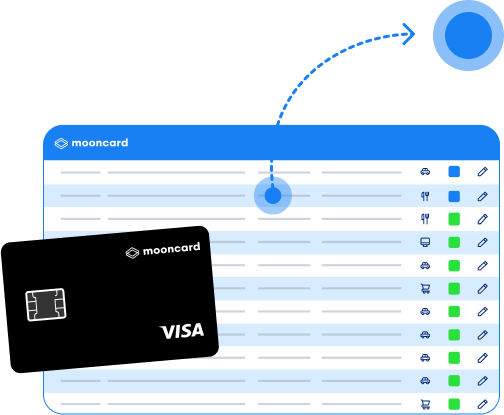
Why choose Mooncard for your business expenses?
.png)
-
Pay with your Mooncard card during your business travel
Pay with your card; the photo of the receipt will be saved electronically as legal proof. Using the mobile app, you can send the photo directly to the system, manage approval notifications and get information on your expenses
-
Save time
Mooncard automatically records your expense reports, including the deductible VAT details. Our accounting engine enables you to track expenses in real time. For each expense, we generate for you the accounting entries that you can import directly into your accounting software.
-
Manage your budget in real time
Improve your productivity and profitability by taking control of your expenses, creating alerts and reports and anticipating peaks in business activity to optimise your cash flow.
Business expenses : the complete guide
The way in which a company manages its business expenses can have an impact on its profitability, competitiveness and growth. By monitoring expenditure, a company can minimise waste, safeguard its finances and optimise the use of its capital. This can help the company make the right business decisions for the future. There are several angles to take into account when trying to improve business expense management, including purchasing procedures, business costs, fixed costs and so on. Mooncard provides a framework to help you understand this key business activity.

Table of contents
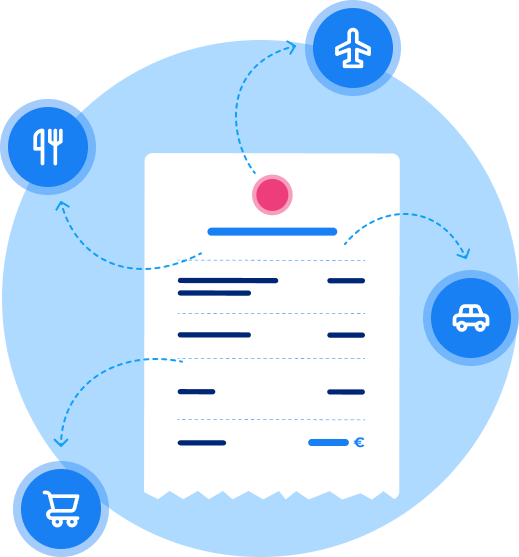
What are business expenses?
The term “business expenses” refers to all the costs involved in running a business. It is essential to understand what this means from the point of view of HMRC in order to maximise your tax benefits and continue to grow as a company, even if you are self-employed. In terms of keeping track of your business expenses, it is important to record all expenditures for goods or services that are required to run the business.
As with so many aspects of HMRC regulations, in order to qualify as a business expense, a cost must be both “necessary” and “wholly and exclusively” incurred in the course of running the business. If (and only if) an expense meets this definition can it be considered allowable and therefore tax-deductible, thus contributing towards reducing your tax bill.
Read more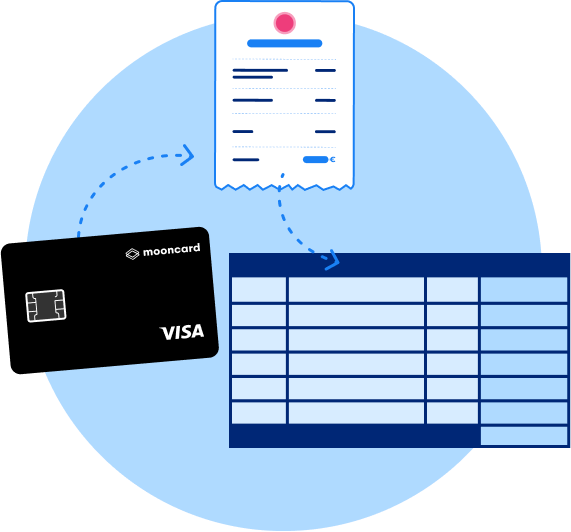
Optimising the purchasing process
The purchasing process is a key element in any successful business strategy. Optimising the purchasing process can have a direct and very real impact on the profitability of your company. By carefully monitoring, adjusting and optimising the purchasing process, you will be able to:
- Reduce unnecessary expenditure
- Ensure suppliers’ quotes are competitive
- Identify the value for money
- Increase the gross profit of your company
- Enhance productivity
- Eliminate problems in the supply chain
- Identify budget overspends
- Improve relationships with suppliers
As most companies now see the value of mainstreaming corporate social responsibility throughout their processes, this should also be taken into account when creating or adjusting your purchasing process. Issues such as fair-trade and sustainable resources, the carbon footprint involved in transporting supplies and non-discrimination policies are all likely to feature in a comprehensive purchasing policy.
Read more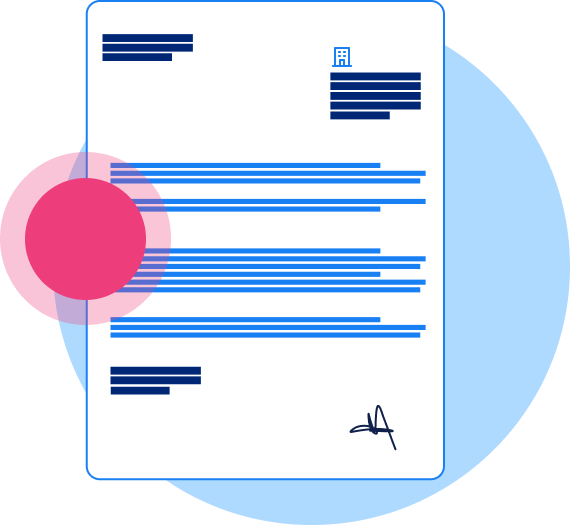
What are start-up costs?
As any seasoned business owner will tell you, one of the key factors as to whether a new company will succeed is whether the costs involved in establishing it have been accurately anticipated. So what are the main costs of starting up a business?
- Market research (does the company fill a real gap in the market?)
- Filing patents, trademarks and copyright with the Intellectual Property Office
- Creating a website and corporate identity
- Translating key documents into local languages
- Registering the company with Companies House
- Accounting and/or financial advice
- Legal assistance with drafting statutes
- Legal costs involved in signing a rental agreement, lease or property purchase
- Essential business supplies (computers, office furniture, etc.)
- Recruitment costs
Even the smallest of businesses, including those run from home, will incur many of these fixed costs. It is important to anticipate these costs, and many more besides, before launching into creating a business. Depending on the nature of the business, all of these costs are likely to fall within the HMRC definition of a tax-deductible business expense.
Read more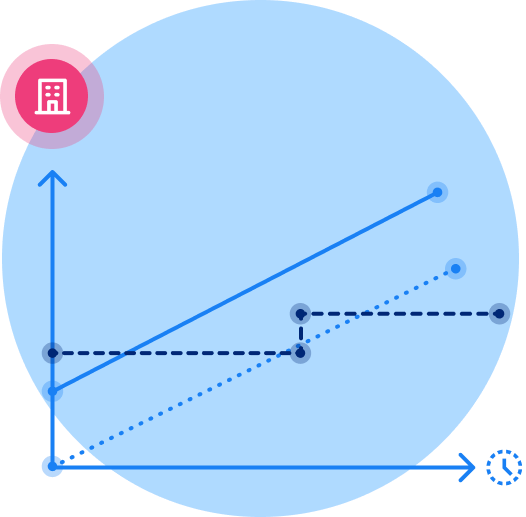
What are the fixed costs ?
As well as the one-off costs involved in setting up the business, there are also regular fixed costs which need to be taken into account. These costs are essential running costs and are also considered, in most circumstances, to be tax-deductible business expenses.
The costs of things such as salaries, rents, insurance premiums, electricity bills, fuel costs, interest payments on loans, warehouse fees, marketing, training etc are all regular costs that need to be anticipated. Similarly, professional services such as legal and financial advice, providing certificates and inspections to comply with health and safety legislation or providing environmental certificates may also all incur costs which need to be accounted for.
These costs are referred to as “fixed” costs because they have to be paid regardless of the turnover the company is making. Costs such as the ongoing purchase of stocks, travel, shipping and postage costs vary depending on how much of the company’s goods or services are being sold. These are known as “variable” costs.
FAQ
What are the advantages of good business expense management?
Managing your business expenses allows you to:
- Better anticipate changes in the market
- Build cash reserves to deal with unforeseen expenses
- Protect your business from bankruptcy by having sufficient liquidity
- More accurately assess the company’s profitability
- Eliminate unnecessary expenditure
- Make informed decisions at the right time
- Simplify tax returns and payments
- Identify tax-deductible expenses
How should business expenses be managed?
In order to effectively manage business expenses, it is essential to:
- Define a budget by type of expenditure
- Establish a procedure for refunding an expenses claim
- Use a digital business expenditure management solution
- Equip staff with corporate payment cards to make it easier to track their professional expenses
- Identify and eliminate poor practices
- Centralise the collection of all expenses claims and receipts
What are the advantages of a business expense management solution?
There are a number of advantages of using business expense management software. These include:
- Time-saving: automatic integration of expenses claims, centralisation of information, archiving of relevant receipts, simplification of VAT returns, automation of time-consuming administrative tasks
- Greater autonomy for your staff: corporate payment cards which are dedicated to business expenses, personalisation of payment and withdrawal limits, real-time visualisation of expenses
- Fewer risks of errors in processing expense claims. Information on banking transactions (nature, amount, VAT) is directly sent to the accounting department. There is less need for manual data entry
What are the main costs a company incurs?
A company’s expenses are split into two categories: fixed costs and variable costs.
Some of the most common fixed costs include:
- Staff salaries
- Rent and maintenance costs of properties
- Taxes
- Cost of maintaining equipment
- Interest on banking loans
Variable costs, also known as operating costs, may include:
- Buying raw materials
- Transport costs
- Packaging costs
- Sub-contracting operations
Key issues in good business expense management
There are a number of risks of managing a company without having a clear overview of expenditure, including:
- Taking poor decisions
- Accumulating unnecessary expenditure
- Overestimating your income
In contrast, by adopting good expense management practices, you will have greater visibility over your finances. By tracking your expenditure in real-time, you will be able to effectively lead your company. Year after year, your resources will be better used. They will be adapted to each project, depending on the return on investment that they generate.
How can you establish an expense policy for your company?
The aim of an expense policy is to:
- Regulate business expenses incurred by staff
- Define the rules to apply concerning business expenses
- Standardise the reimbursement of expenses claims
- Limit the risks of penalties in the event of a tax inspection
An expense policy aims to establish a list of expenses which are eligible to be reimbursed by the employer. For each type of expense, the allocated budget and the status must be identified. For example, how much will the employer cover for overnight hotel accommodation? When it comes to train travel, should employees travel first class or second class?
To guarantee the success of your expense policy, it must be fully understood by your staff. If necessary, establish penalties if the established rules are not respected.
Do we need receipts for all business expenses?
Receipts must be kept for all expenses which you intend to declare as part of your tax declaration. In most cases, these should include the date of the transaction, the nature of the transaction (hotel accommodation, train ticket, purchase of supplies, etc.) and the name, address and VAT number of the seller or provider.
Gone are the days, however, of crumpled receipts and dog-eared parking tickets. Nowadays, employers can keep track of their employees expenses and receipts using digital records. Mooncard can help you shift to paperless record-keeping, making it easier to record comprehensive and accurate information.


Need more information?
Our team is available Monday to Friday from 9 a.m. to 7 p.m. to present the Mooncard solution to you and work with you to design a tailor-made quote corresponding to your business needs.
